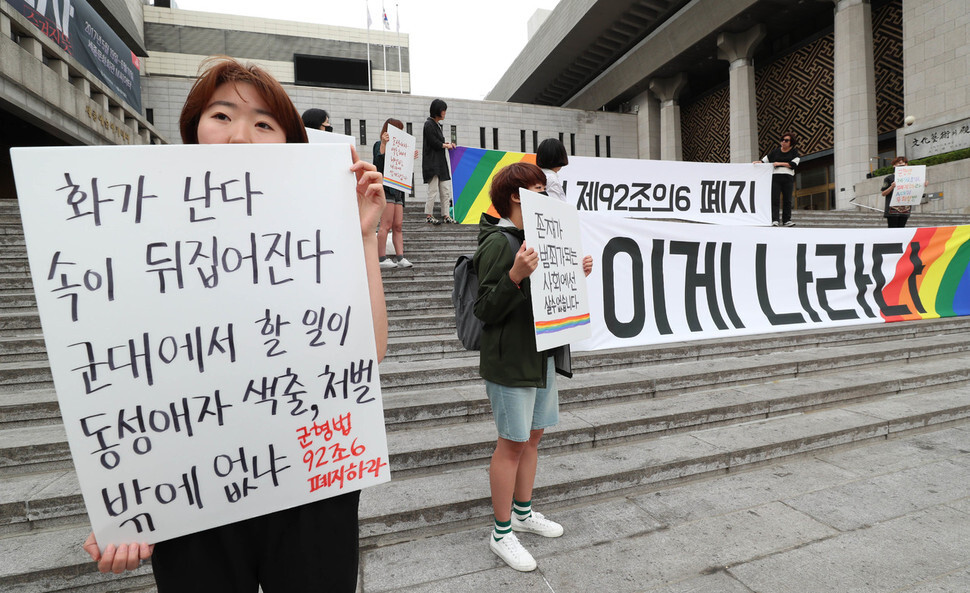hankyoreh
Links to other country sites 다른 나라 사이트 링크
Sexual acts by convicted military captain were all consensual

After a South Korean military court recently convicted a captain for having sexual relations with soldiers of the same sex, the Hankyoreh confirmed that the sexual acts that served as the grounds for the conviction were consensual. This contradicts a statement released to the media shortly after the court’s decision in which the Ministry of National Defense said that the captain, identified by the surname Lee, had “molested his subordinates on several occasions,” creating the impression that he had exploited his position and power to force subordinates to have sex with him. The Center for Military Human Rights, Korea (MHRK) is preparing a lawsuit, describing the Ministry‘s statement as “clearly representing the dissemination of false information.”
According to the formal charges against Lee by military prosecutors that were reviewed by the Hankyoreh on May 28, Lee was charged with having sexual relations four times with three soldiers of the same sex between June 2016 and the end of Oct. 2016. Lee met these other individuals on websites and apps frequented by homosexuals. Lee’s dating partners had the ranks of sergeant, lieutenant and staff sergeant. All of them were lower in rank than Lee, but he did not use his rank to arrange the dates.
After the military court found Lee guilty on May 24, the Defense Ministry told the media that “the court concluded that [Lee] had degraded military discipline by molesting his subordinates inside the barracks while on duty,” creating the impression that Lee had taken advantage of his higher rank to force subordinates to have sexual relations with him. But the formal charges against Lee only state that he had sexual intercourse in motels with soldiers who had voluntarily met him on an app for homosexuals, and there was no evidence that he forced them to do so against their will. But the military prosecutors categorized all these actions as “molestation” in their indictment of Lee. Article 92-6 of the Military Criminal Act, which states that someone who “commits anal intercourse with” or otherwise molests a soldier, civilian employee of the military or military cadet “shall be punished by imprisonment with labor for not more than two years,” was used as the grounds for interpreting consensual gay sex as “molestation.” For the Ministry to nevertheless explain that the military court had also acknowledged this as “molestation” is very misleading, some say.
Another controversial point was the Ministry‘s reference to Lee committing these acts while “on duty,” because one of the four sexual encounters occurred during lunch. “Lee spent some private time in the barracks during lunch, when he was on break, but this is being portrayed as deviant behavior while on duty,” said Kang Seok-min, the lawyer defending Lee. The other three sexual encounters occurred off the base, while Lee was off duty.
During a telephone interview with the Hankyoreh on May 28, a military source said that the phrase “molested subordinates on several occasions” had been used because “gay sex was ’molestation‘ according to the Military Criminal Act.” This official also said that “in the army, you’re on duty even at lunchtime.”
“The army is spreading rumors about Lee. We‘re going to file charges against them for defamation,” MHRK said.
By Heo Jae-hyun, staff reporter
Please direct questions or comments to [english@hani.co.kr]

Editorial・opinion
![[Column] Season 2 of special prosecutor probe may be coming to Korea soon [Column] Season 2 of special prosecutor probe may be coming to Korea soon](https://flexible.img.hani.co.kr/flexible/normal/500/300/imgdb/original/2024/0426/3317141030699447.jpg) [Column] Season 2 of special prosecutor probe may be coming to Korea soon
[Column] Season 2 of special prosecutor probe may be coming to Korea soon![[Column] Park Geun-hye déjà vu in Yoon Suk-yeol [Column] Park Geun-hye déjà vu in Yoon Suk-yeol](https://flexible.img.hani.co.kr/flexible/normal/500/300/imgdb/original/2024/0424/651713945113788.jpg) [Column] Park Geun-hye déjà vu in Yoon Suk-yeol
[Column] Park Geun-hye déjà vu in Yoon Suk-yeol- [Editorial] New weight of N. Korea’s nuclear threats makes dialogue all the more urgent
- [Guest essay] The real reason Korea’s new right wants to dub Rhee a founding father
- [Column] ‘Choson’: Is it time we start referring to N. Korea in its own terms?
- [Editorial] Japan’s rewriting of history with Korea has gone too far
- [Column] The president’s questionable capacity for dialogue
- [Column] Are chaebol firms just pizza pies for families to divvy up as they please?
- [Column] Has Korea, too, crossed the Rubicon on China?
- [Correspondent’s column] In Japan’s alliance with US, echoes of its past alliances with UK
Most viewed articles
- 1Samsung subcontractor worker commits suicide from work stress
- 2‘We must say no’: Seoul defense chief on Korean, USFK involvement in hypothetical Taiwan crisis
- 3[Editorial] Korea’s surprise Q1 growth requires objective assessment, not blind fanfare
- 4Division commander ordered troops to enter raging flood waters before Marine died, survivor says
- 5Is Japan about to snatch control of Line messenger from Korea’s Naver?
- 6No good, very bad game for Korea puts it out of Olympics for first time since 1988
- 7US overtakes China as Korea’s top export market, prompting trade sanction jitters
- 8N. Korean delegation’s trip to Iran shows how Pyongyang is leveraging ties with Moscow
- 9Korea’s 1.3% growth in Q1 signals ‘textbook’ return to growth, says government
- 10[Column] Season 2 of special prosecutor probe may be coming to Korea soon